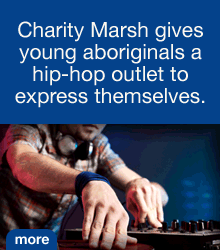The Politics and Power of Spoken Word Poetry
Sarah Bernstein, Experience Congress 2011
El Jones, Halifax’s amazingly versatile spoken word artist, activist, teacher, and academic, lit up Congress Saturday May 28th with an afternoon performance and talk-back session. She discussed, among other things, spoken word’s potential for social change.
For Jones, spoken word provides a platform for marginalized voices — it offers the possibility of “an authority that’s particularly denied to a woman of colour. Being able to name it, voice it, is what gives you power.”
Jones sees spoken word as the political arm of hip-hop. She values the performative aspect of the genre for the symbiotic possibility between listener and speaker, for its immediacy in reaching audiences – the students she teaches, for instance (for whom, she assures us, she tweaks the sometimes-adult vocabulary).
“It’s empowering,“ Jones says, “because you are allowed to circumvent processes of publication.” At the same time, she worries about the passing nature of the orally-transmitted message. “It’s a fraught position,” she says. “It’s invigorating, because it tries to stay current, but there is this ephemeral quality if you don’t publish. I worry about it, because it’s already marginalized people working within a marginalized art form.” But, it seems, Jones, poised as she is, is able to find that fine balance and get out her message.
Jones’s poems deal with a variety of topics, but the governing themes of her work are those of racial and gender violence. During the talk-back portion, Jones addresses how dealing with these themes has often caused her to be persona non grata. “I’ve been told that I deserve it because I make people uncomfortable,” she laughs. It’s true – her emotive performances are affecting in a way that is unsettling, that forces audience members to confront aspects of themselves (and, perhaps, of society) that have been willfully suppressed.
El Jones is also a member of the Word Iz Bond Spoken Word Artists’ Collective that stages monthly performances in Halifax called “SPEAK!”
Photo by Jared Morrison













